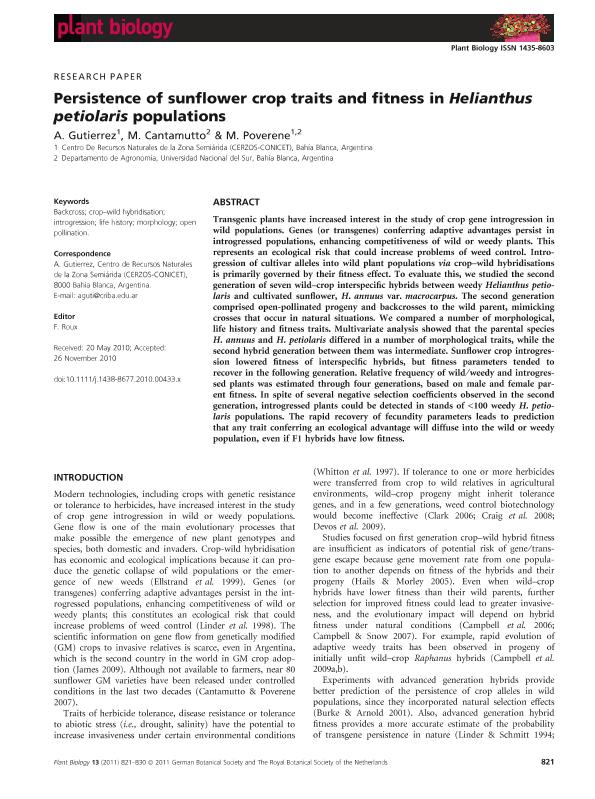Mostrar el registro sencillo del ítem
dc.contributor.author
Gutierrez, Agustina

dc.contributor.author
Cantamutto, Miguel Angel

dc.contributor.author
Poverene, Maria Monica

dc.date.available
2017-06-30T21:01:32Z
dc.date.issued
2011-09
dc.identifier.citation
Gutierrez, Agustina; Cantamutto, Miguel Angel; Poverene, Maria Monica; Persistence of sunflower crop traits and fitness in Helianthus petiolaris populations; Wiley Blackwell Publishing, Inc; Plant Biology; 13; 5; 9-2011; 821-830
dc.identifier.issn
1435-8603
dc.identifier.uri
http://hdl.handle.net/11336/19347
dc.description.abstract
Transgenic plants have increased interest in the study of crop gene introgression in wild populations. Genes (or transgenes) conferring adaptive advantages persist in introgressed populations, enhancing competitiveness of wild or weedy plants. This represents an ecological risk that could increase problems of weed control. Introgression of cultivar alleles into wild plant populations via crop–wild hybridisations is primarily governed by their fitness effect. To evaluate this, we studied the second generation of seven wild–crop interspecific hybrids between weedy Helianthus petiolaris and cultivated sunflower, H. annuus var. macrocarpus. The second generation comprised open-pollinated progeny and backcrosses to the wild parent, mimicking crosses that occur in natural situations. We compared a number of morphological, life history and fitness traits. Multivariate analysis showed that the parental species H. annuus and H. petiolaris differed in a number of morphological traits, while the second hybrid generation between them was intermediate. Sunflower crop introgression lowered fitness of interspecific hybrids, but fitness parameters tended to recover in the following generation. Relative frequency of wild ⁄weedy and introgressed plants was estimated through four generations, based on male and female parent fitness. In spite of several negative selection coefficients observed in the second generation, introgressed plants could be detected in stands of <100 weedy H. petiolaris populations. The rapid recovery of fecundity parameters leads to prediction that any trait conferring an ecological advantage will diffuse into the wild or weedy population, even if F1 hybrids have low fitness.
dc.format
application/pdf
dc.language.iso
eng
dc.publisher
Wiley Blackwell Publishing, Inc

dc.rights
info:eu-repo/semantics/openAccess
dc.rights.uri
https://creativecommons.org/licenses/by-nc-sa/2.5/ar/
dc.subject
Backcross
dc.subject
Crop-Wild Hybridization
dc.subject
Introgression
dc.subject
Life History
dc.subject
Morphology
dc.subject
Open Pollination
dc.subject.classification
Otras Ciencias Agrícolas

dc.subject.classification
Otras Ciencias Agrícolas

dc.subject.classification
CIENCIAS AGRÍCOLAS

dc.subject.classification
Otras Ciencias Agrícolas

dc.subject.classification
Otras Ciencias Agrícolas

dc.subject.classification
CIENCIAS AGRÍCOLAS

dc.title
Persistence of sunflower crop traits and fitness in Helianthus petiolaris populations
dc.type
info:eu-repo/semantics/article
dc.type
info:ar-repo/semantics/artículo
dc.type
info:eu-repo/semantics/publishedVersion
dc.date.updated
2017-05-02T18:58:51Z
dc.journal.volume
13
dc.journal.number
5
dc.journal.pagination
821-830
dc.journal.pais
Reino Unido

dc.journal.ciudad
Londres
dc.description.fil
Fil: Gutierrez, Agustina. Consejo Nacional de Investigaciones Científicas y Técnicas. Centro Científico Tecnológico Conicet - Bahía Blanca. Centro de Recursos Naturales Renovables de la Zona Semiarida. Universidad Nacional del Sur. Centro de Recursos Naturales Renovables de la Zona Semiarida; Argentina
dc.description.fil
Fil: Cantamutto, Miguel Angel. Universidad Nacional del Sur. Departamento de Agronomía; Argentina
dc.description.fil
Fil: Poverene, Maria Monica. Consejo Nacional de Investigaciones Científicas y Técnicas. Centro Científico Tecnológico Conicet - Bahía Blanca. Centro de Recursos Naturales Renovables de la Zona Semiarida. Universidad Nacional del Sur. Centro de Recursos Naturales Renovables de la Zona Semiarida; Argentina
dc.journal.title
Plant Biology

dc.relation.alternativeid
info:eu-repo/semantics/altIdentifier/url/http://onlinelibrary.wiley.com/doi/10.1111/j.1438-8677.2010.00433.x/abstract
dc.relation.alternativeid
info:eu-repo/semantics/altIdentifier/doi/http://dx.doi.org/10.1111/j.1438-8677.2010.00433.x
Archivos asociados
